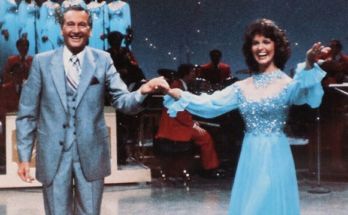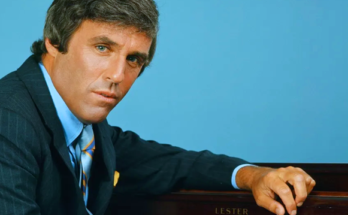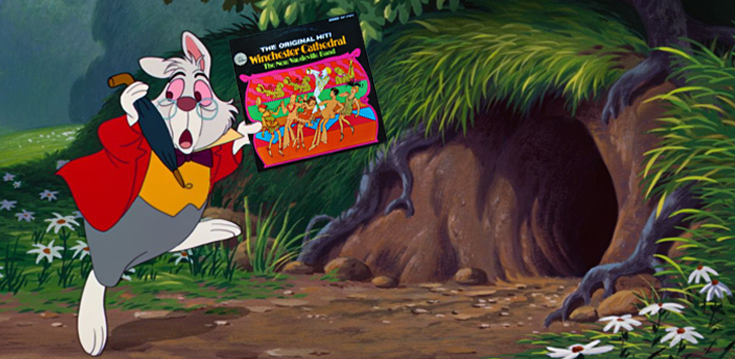
Rabbit holes are funny things. This morning, Christmas Day, 2020, I was goofing around on Facebook when I saw a post mentioning the ’70s song “Beautiful Sunday” by Daniel Boone. Now, that is a song that has been preserved in the amber of my earliest conscious memories of music, but I have not heard it in years and years. As is my wont, I decided to google Daniel Boone and find out more.
Right in the middle of his wiki is this factoid: Peter Green aka Peter Lee Stirling aka Daniel Boone’s first single under that moniker was a song called “Daddy Don’t You Walk So Fast,” which you probably recall from Wayne Newton’s hit rendition. But what caught my eye was the composer of that song, a British gent named Geoff Stephens. My mind immediately flashed back to a hugely foundational memory — the Big Bang moment of my lifelong habit of collecting vinyl.
(I told you, rabbit holes.)
In 1982 I was living with my grandmother in the immediate wake of my grandfather’s unexpected passing. We lived in a small town in South-Central Kansas, right on the Oklahoma border. My mother had vanished again, this time I think maybe to jail, and my poor grandma — who had been married since age 15 in 1939 — was suddenly not only without a domestic partner, but additionally found herself saddled with me and my younger brother, in addition to her own ancient Okie father, John, a cryptic railroader born in the 19th century. We were quite a crew.
Sometime that summer I was out running the neighborhood when I spied a huge trove of discarded goodies piled all around somebody’s trashcans in the alley across the street from my grandmother’s house. I knew that the old lady to whom this trash belonged had just recently passed away, and guessed that this stuff was what was leftover from her estate sale. At this time I was 13 years old but already an experienced “picker” of refuse; I had spent most of my youth outside of school in a state of lax (in fact, mostly nonexistent) supervision, and starting at about age eight had run the streets and alleys picking up thrown-out treasures of all sorts. I could positively smell gold in this pile from all the way down the block.
There was a cool old wooden toy archery bow from probably the ’50s, which I took. Lots of random household stuff too anodyne to recall now. But the Holy Grail in this pick was a stack of well-kept vinyl records, almost entirely from the ’50s and ’60s. Right on top of the stack was Jo Ann Castle’s debut album, recorded when she was a teen accordion star. I recognized her name from the Lawrence Welk program, which I had watched on Saturday evenings with my grandmother my entire life, and figured it would be worth a listen. (It was, and is!)
Next in the pile: The New Vaudeville Band’s “Winchester Cathedral” LP. The bold, whimsical 1920s throwback cover art captured my attention, and the all-caps THE ORIGINAL HIT! emblazoned across the top of the jacket got me thinking, “What hit?” I had no memory of the title track but now I was intrigued. I flipped the LP over and looked at the back. The band photo and liner notes deserved more scrutiny than a quick skimming in the alley, I decided. I looked back at the pile of records, maybe 15 or 20 altogether. I put the bow over my shoulder, snatched up the whole stack and walked back around the corner to our house.
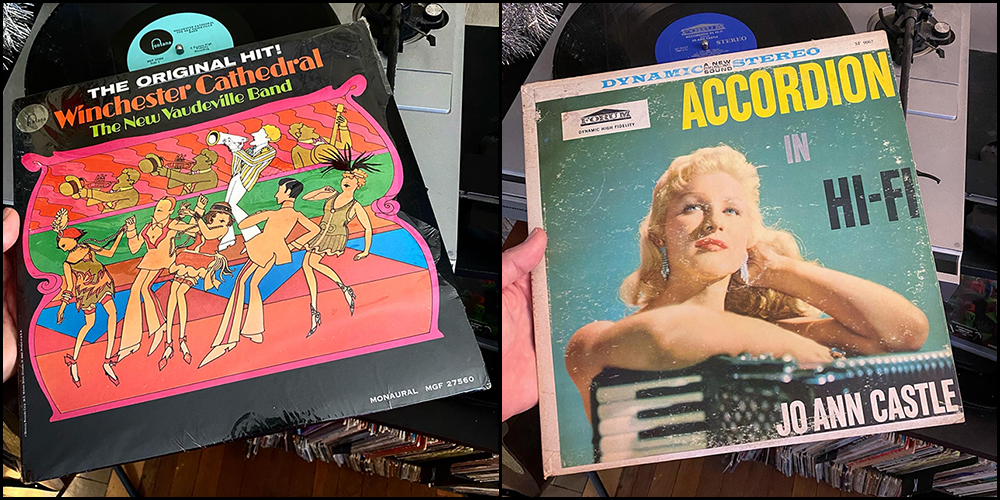
The timing could not have been better. I had, in fact, played lots of records by this point in my life, but they had primarily been things my mother or stepfather had lying around, predominantly seven-inch singles: “Kiss and Say Goodbye” by the Manhattans, Ray Stevens’ “The Streak,” C.W. McCall’s trucker classic “Wolf Creek Pass” with the lost-dog tale “Sloan” on the b-side, “Long Cool Woman in a Black Dress” by the Hollies, Freddy Fender’s “Wasted Days and Wasted Nights” with “Rancho Grande” on the back. (I used to sing along in phonetic quasi-Spanish to that one.) But I never had my own record player — until right at this moment, when Grandpa John moved into the house with us and I was allowed to hook up his considerable home stereo system in my bedroom. I had already been spending all my paper route money on cassettes of new releases, but with my own record player in my room, a whole world of music possibilities was unfolding before my eyes and ears.
I put on the New Vaudeville Band album and “Winchester Cathedral” came on. I didn’t recognize it but I have to admit I liked it immediately. It wasn’t anything like what I was hearing on the radio in 1982, for sure. I studied the album cover and guessed it was from the ’60s but was consciously aping the vibe of the ’20s when guys like Rudy Vallee sang through megaphones — except this iteration was presented in super high fidelity sound. I chortled when the guy sang, “oh, vo-dee-o-doe,” as I recognized the term as Laverne & Shirley’s euphemism for sex. The next song was a rather rigid “Lilli Marlene,” the World War II torch song most closely associated with Marlene Dietrich. “Are all the songs really old-timey like this?” I wondered. I found the whole anachronistic conceit strangely fascinating.
But to be honest, most of the rest of the album is forgettable for reasons I understand better now than I did then. The material is wildly uneven, as are the arrangements, and there are at least two different vocalists on here, at least one of which is not very good. That said, there are a few notable highlights.
For one, there is a song called “Whatever Happened to Phyllis Puke?” which I find interesting now because it was written by Alan (not Allen) Klein, a cohort of legendary British production weirdo Joe Meek — but which i found interesting then because it had the word “puke” in the title. There’s a version of “A Nightingale Sang in Berkeley Square,” a song I had heard somewhere, probably in my grandmother’s collection of eight-track tapes. And then, buried on side two, is “Kind of Hush,” a song I already knew well from both the Herman’s Hermits and Carpenters versions. The recording on this album, I know now, is the first, and listening today it sounds like a wobbly demo, which I suppose it was, in a sense.

But more than the music, this dopey quasi-novelty record made an impact on me with the liner notes. There is a photo of the “band” on the back of the album cover, but I think it’s just whatever current group of studio musicians was cobbled together to perform the material. The liner notes, which follow, led me to wrongly assume that Geoff Stephens was the guy sitting down in the photo at sort of the focal point of the image.
Geoff Stephens likes old records. He liked them so much that he spent considerable time rambling in old junk shops for out-of-date 78 rpm’s from the 1920’s and 1930’s. And when this former school teacher gave up the books a few years ago and became involved in the music business as a songwriter, producer, and manager, it figured that, sooner or later, he’d do something about his first love… the sound of old records. One day, Geoff Stephens turned out a song that, by now, virtually everyone has heard. It was “Winchester Cathedral,” and Stephens knew exactly how it must sound.
So, he sang it himself — in a high-pitched tenor right out of those 1920 and 1930 recordings he had collected. The result? Not only the fastest selling record in Fontana’s history, but also a huge public demand for more of the “new” old sound. The New Vaudeville Band was born. The New Vaudeville Band soon was seen on major programs like Ed Sullivan’s show. A new musical trend was underway.
Here is a collection of that new “old” sound as put together in the inimitable fashion of the New Vaudeville Band. We think it’s out of sight, just too much… or, er… uh… better yet, the cat’s whiskers. Or how about the bees’ knees?
— Jere Real
A fair amount of that is clearly snake oil. Geoff Stephens indeed wrote “Winchester Cathedral” and “Kind of Hush” and a couple others on this record, but he doesn’t sing a single note here, or on any recordings anywhere, as far as I can tell. He was a songwriter and a record producer — a job description I didn’t really comprehend when I was 13. But that’s not what’s important here. Contained in these throwaway liner notes, which I am sure were written in ten minutes while the record plant’s graphic designer stood in the doorway tapping his foot, is a jewel: the idea that old sounds are as good as new sounds. I was already a digger, accustomed to rooting through garbage for hidden treasure. But that day, a little lightbulb went on in my head.
You can do that with music, too.
I started going through my great-grandfather’s records to see what might be hidden in there. He was a lifelong music hound himself; my grandmother recalls that no matter how miserly he might have been in other ways, the house she grew up in always had a nice radio, and then later on, what was at the time a large television. Back before he moved in with us, the old man was so cheap he refused to turn on his air conditioner in the height of summer, and only ran a window fan with a one-hour timer on it once a day to exchange the air in his house — but he had a spendy Pioneer component stereo system to listen to his records on while he sat in a puddle of sweat.
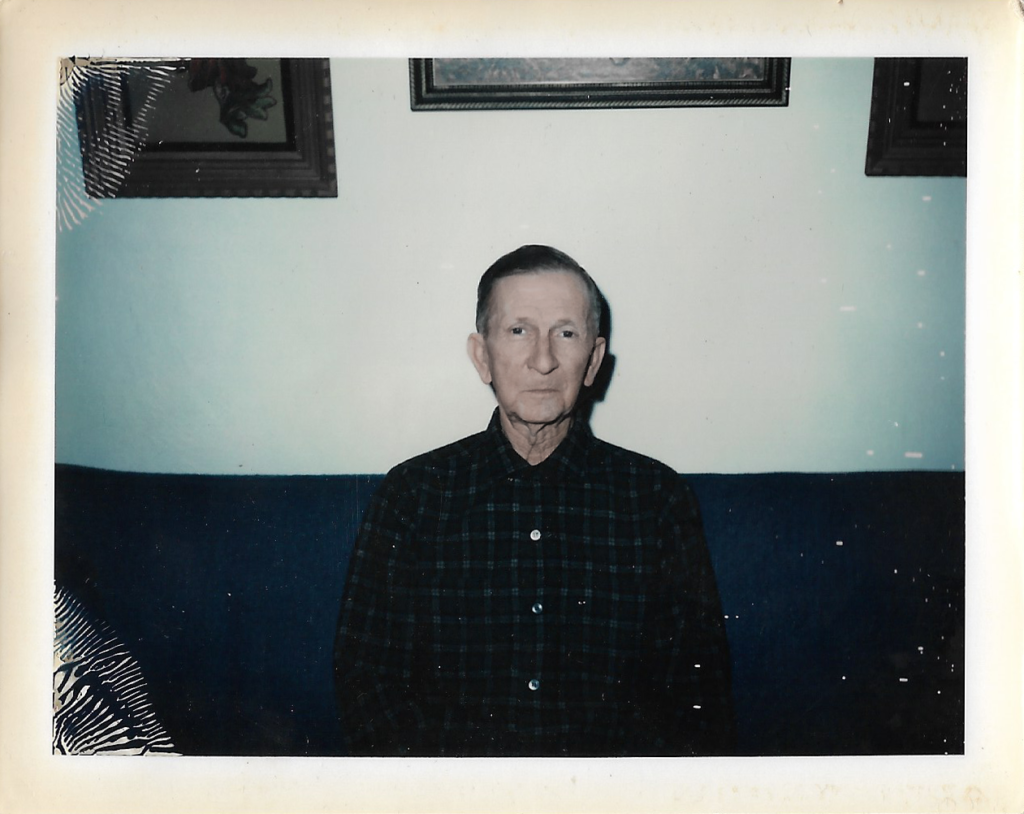
Grandpa John was not a man given to idle conversation but I know he was pleased to see me taking an interest in his music collection. Among the titles were the kinds of things you might expect of an Okie born in 1898 — schmaltzy waltzes, Ken Griffin’s snoozy organ, some hillbilly stuff. I very quickly discovered that I absolutely loved the Mills Brothers. There was a Duane Eddy record with that famously twangy guitar, which I really dug. A wonderful field recording album called “Music of the Ozarks,” put out by National Geographic. The space-age elevator music of The Three Suns. Country classics from Cowboy Copas, Hank Williams, Johnny Bond, T. Texas Tyler, Ernest Tubb, Bob Wills and the Texas Playboys. I had already picked up a lot of big band and ’50s rock music from my grandma, but now my music education was getting really fleshed out in new ways.
One day my grandmother drove with one of her sisters to a bigger town over the Oklahoma line to do some shopping. My little brother and I were both at school or otherwise out of the house, too. Grandpa John took advantage of our absence that afternoon by getting into his bottle of Weller’s. (Why he did this only when nobody was around was a mystery to me; my grandmother drank socially, as did all of her family and friends. Certainly nobody would have judged him for having a snort of whiskey. But as I mentioned before, he was a mysterious fellow, a sphinx. He had his reasons, I suppose.)
I came home that afternoon, through the back door under the carport as we always did, to a silent house. I walked through the kitchen to the living room and my heart jumped when I saw Grandpa John lying in the middle of the floor, flat on his back. I thought for sure he was dead. And then his eyes opened and he turned his head over so slightly toward me.
“Mike,” he said in his asthmatic ancient wheeze, “don’t you ever start drinkin’. You feel like you’re on top of the world, then the next mornin’, you feel like hell.”
I walked over to him and bent down to help him up, but he put up his hands, rebuffing my effort.
“No, no, just leave me here,” he said with an air of resignation. “I got down here all by myself, I’ll get myself back up.”
“Come on,” I replied, holding my hand out to him. He shook his head.
“Nope,” he said. “I don’t deserve any help.”
Now that I knew he wasn’t dead, or even apparently hurt, I was relieved enough to find the situation a little comical. But still I didn’t want the old fellow to suffer.
“Can I bring you a pillow, at least?” I asked.
“Nope.”
“Blanket?”
“Nope, just let me be.”
I thought for a moment.
“Do you want me to put on a record?” I asked.
The old man on the floor lay perfectly still for a long moment, and then his face softened into almost a smile.
“Yeah, why don’t you?”
I thumbed through the selections in the wooden record rack that Grandpa John, who worked wood as a hobby, had made in his old basement. (The rack in fact sat on top of a wooden cabinet he also made.) I found the Mills Brothers’ “Yellow Bird” LP and put it on.
“Yellow bird, up high in banana tree… Yellow bird, you sit all alone like me…”
I looked over at the old man, stretched out on the floor, immersed in the rich, gentle swoon of the Mills Brothers’ trademark harmonies. His eyes were closed, and before long his mouth fell open just a little as he lapsed into sleep. I left him and went into my room for a while, and when I came back out to check on him, he had managed to get himself up off the floor and made a silent retreat to his room.
Grandpa John died in 1987, right after his 88th birthday and shortly before I graduated from high school. He would have turned 122 this week.
I went on, as you know, to beome a voracious music hound and record nerd. In my house today, despite the many losses of my adult life, I still have not only that Jo Ann Castle record and the bulk of Grandpa John’s collection, but also the wooden cabinet and record rack he made.
And I started my day today — Christmas Day — reading a random post about “Beautiful Sunday” and ended up here, all because I happened across the name of Geoff Stephens — who, in an instance of extraordinary coincidence, passed away yesterday, December 24, 2020.
Rabbit holes are funny things.


